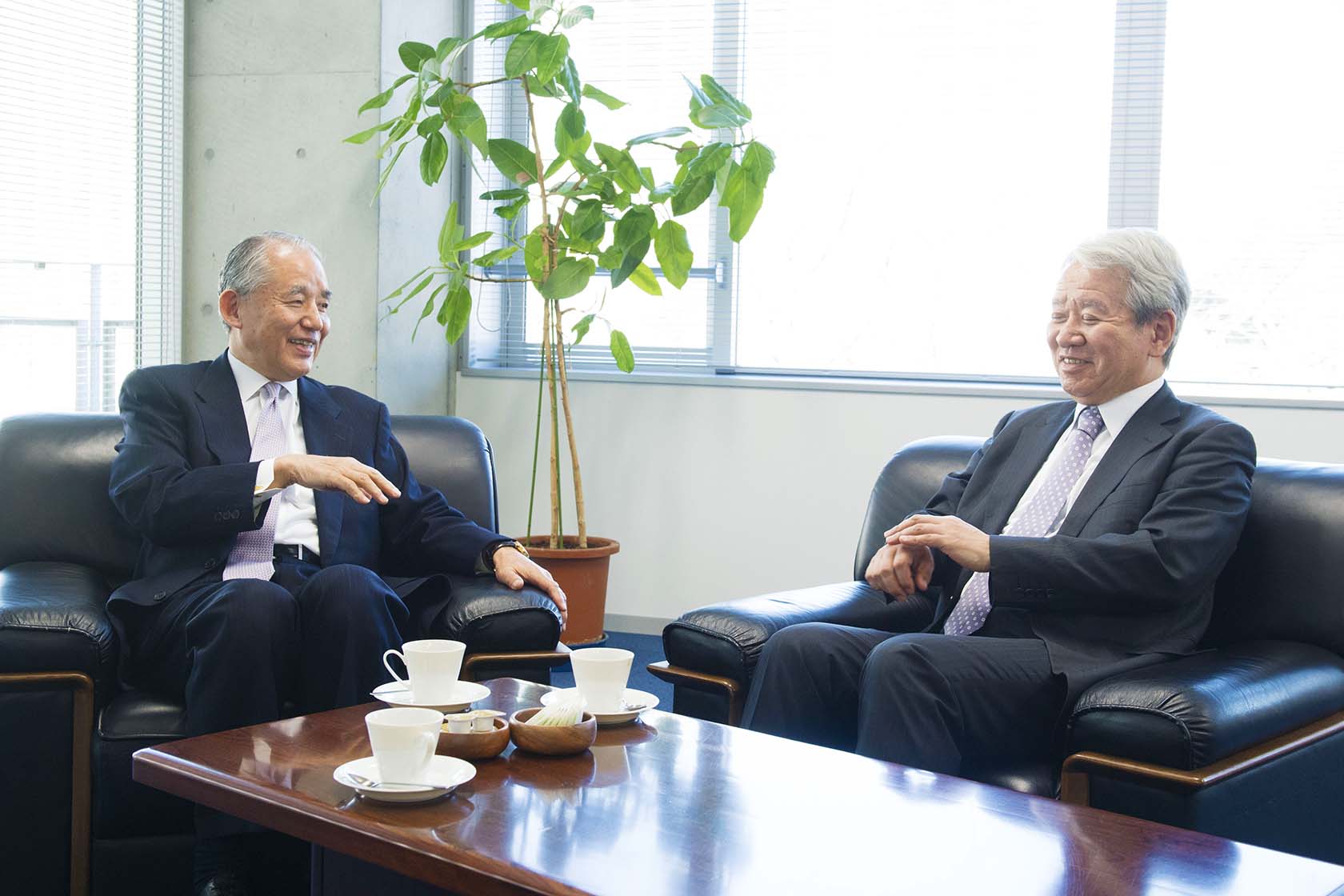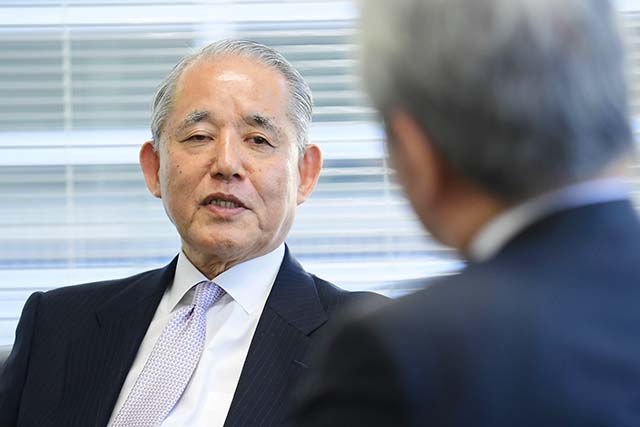Pensée Talk #1
Yasuchika Hasegawa (Corporate Counselor, Takeda Pharmaceutical Company Ltd.) × Akihiko Tanaka (President, GRIPS)
(From the March 22, 2018 edition of Pensée)
In our first issue, we speak with Yasuchika Hasegawa, Corporate Counselor to Takeda Pharmaceutical Company Ltd. Mr. Hasegawa has a wealth of domestic and international experience, predominantly in healthcare. The discussion spans the global power balance and the position of China, the future of Japanese society, and the role that GRIPS can play in that context. Through his dialogue with President Tanaka, Mr. Hasegawa, who has spent his life working to advance globalization and diversity, shares his view of our world today.
China is continuing to make its presence felt globally. How far will its growth continue?
—At the beginning of the year, Ian Bremmer announced his Top Risks for 2018. What are your thoughts on that list and the current world situation?
Hasegawa First, there’s the fact that America recognizes that while China and Russia are difficult to deal with, they are also partners and it’s necessary to get along with them. Some authoritarian countries have demonstrated outstanding economic growth and have become economic powers, far surpassing many developed nations. This poses the risk that people will start to get the idea that authoritarian states can “do it better.” How we reorganize ourselves in the face of this—that’s one global issue.
Another issue from a business perspective is how fast technology is advancing. Just how far will fields such as IoT, AI and robotics progress? We have no way of knowing what kind of influence these developments will have on industry and the wider society.
Last, we are seeing the arrival of a super-aged society. According to Lynda Gratton, half of Japanese children born in 2007 will live to be 107 years old. We face many related issues, such as fossil fuel use and environmental decline, and I think the central theme will be how we reconcile these—how we implement the SDGs.
Tanaka I completely agree with your comments. China certainly poses a great challenge. In many countries standard of living is strongly related to degree of democratization. Democratic countries tend to have higher income levels.
Hasegawa Or used to.
Tanaka Correct. In the past 20 years, there have been striking examples of non-democratic countries seeing increased living standards, for example, Singapore, Saudi Arabia and Brunei. Most of these were small countries, but now there is the case of China, a vast country, raising its living standards without democratization. This has great significance in global history. If China continues to grow, we will be forced to rethink our idea of what kind of political system is necessary to raise living standards.
ーWhat are your views regarding Russia, another key player?
Tanaka Russia has long been unable to create an economy that isn’t dependent on its natural resources. This is a key difference from China.
Hasegawa The decisive difference, I would say.
Tanaka Rather than relying on its resources, China is focusing on manufacturing. It has demonstrated its ability to produce goods at frightening speed. China’s competitiveness is growing dramatically in terms of its ability to actualize the ideas constantly emerging from America. Where will this lead? Will China start to produce ideas domestically too?
Hasegawa I think there’s a good possibility that China will begin producing ideas. At present 1.08 million students from around the world study in America each year, and around one third of those are Chinese. After gaining their doctorates and working in American companies for a while, these people return to China in a steady flow. So I think it’s highly likely that China will catch up to America in terms of ideas.
Tanaka An important factor of China’s success is that thus far they have appointed capable leaders, both economically and politically. I wonder if they’ll be able to keep this up—if it will be possible to continue recruiting the most qualified persons without any liberalization, using only a bureaucratic system of government. I’m curious to see how much freedom they will give their engineers to pursue cutting-edge technology such as AI.
Hasegawa I have similar doubts. Although I’m no scientist, I believe that true disruptive innovation can only come from an environment where you are free to think however you like. However, innovation is coming from China—even though China can’t be said to be a free country in every sense. There’s no precedent, so no one can say how it will turn out.
Diversity lies at the root of the solution to Japan’s problems.
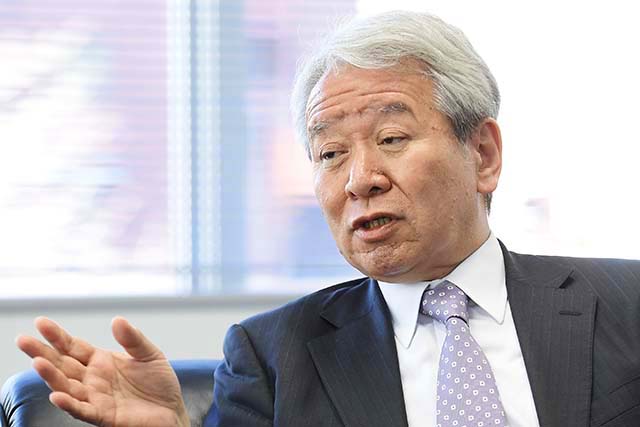 ーWhat do you think the future holds for Japan? Mr. Hasegawa, you have spoken about the importance of innovation at the government’s Industrial Competitiveness Council—what are your current views on Japan, particularly concerning industry and higher education?
ーWhat do you think the future holds for Japan? Mr. Hasegawa, you have spoken about the importance of innovation at the government’s Industrial Competitiveness Council—what are your current views on Japan, particularly concerning industry and higher education?
Hasegawa Perhaps it should be said that we are advancing—but very slowly. While it’s better than not advancing at all, other countries are moving at a much faster pace. A gap is opening between us and them.
ーWhy do you think our progress is slow?
Hasegawa I would say it’s because Japan is complacent, living off the glory of its past achievements. People cling to the unfounded belief that “something will work out.” The job of a leader is to create what I might call a pseudo-crisis. A leader must present a pseudo-crisis to the people in order to prepare for a real crisis before one actually arrives—but I don’t think people in Japan have any sense of crisis at the moment. However, business leaders and managers have to protect business for the stakeholders. You should be prepared to do whatever it takes.
ーI believe you also had some harsh words for universities.
Hasegawa In Japan, there are lots of students who drop out of university in their first year, and schools that can’t fill their quotas. It won’t make any difference to simply increase the percentage of people entering university. I think it would be more effective if Japan could increase the number of technical colleges which can graduate students who are 100 percent employable. Splitting universities into those with a regional and technical focus and those competing on a world scale may be necessary, but unless other important things are changed, no significant improvement is likely. The key to the solution is diversity: we can’t keep relying on Japanese people alone.
Tanaka Diversity is extremely important. I am of the opinion that innovation and knowledge can only develop in a completely free environment. Furthermore, it’s essential to work with people you wouldn’t normally interact with, in order to stimulate each other to grow and to attain better results.
Including private and public institutions, there are about 800 universities in Japan—it would be extremely difficult to create a plan that would apply to all of them. It’s impossible to include large universities like the University of Tokyo and Kyoto University in the same category as smaller institutions.
Hasegawa One of the greatest differences between Japanese and Western universities is that the finances of Japanese universities are neither independent nor well-established. In America, many individuals with capital make significant donations. This in turn contributes to innovation.
Japan has to think about how it can bring about innovation in a Japanese way, how to make an ecosystem best suited to Japan. And then it has to implement it. For example, large corporations should provide funding for promising “start-ups” to let them do a lot of trial and error for five years or so. Even if there are no tangible results, the corporation should be ready to come to the rescue. This could be the kind of approach Japan needs.
Innovation is born where people come together.
Hasegawa Thinking about what the future holds, at the very least Japan needs to cultivate an environment for innovation in its strongest fields, and develop a reputation as a leader in those fields. Robotics, AI, ICT and healthcare—in these fields, Japan needs to at least be able to attract the top talent from Asia.
Tanaka Yes, as things stand now, it would be difficult for Japan to excel in all fields. If that is indeed the case, it’s important to consider focusing on certain areas of strength.
Hasegawa For example, global innovation in medicine takes place in Boston and Cambridge. That’s where the top people from the world come together. There are around 500 bioventure companies—those dealing with biotechnology—packed into a 10 square km area. That’s why over 60% of new, innovative medicine comes from America.
Tanaka Some say that as a result of the advancement of globalization, distance no longer matters. However, talented people actually tend to gather in the places where innovation happens. To bring forth excellent ideas, I think it’s important to have an environment where people can interact directly and freely.
I believe that Japan has some world-class research hubs and exemplary social policies and administration. If we can offer a package of science and social and administrative policy, then Japan can still maintain its global reputation as a good and innovative society.
The role of GRIPS as a center for work towards the SDGs
ーIndustry in Japan is looking to extensively incorporate the SDGs in their goals for innovation.
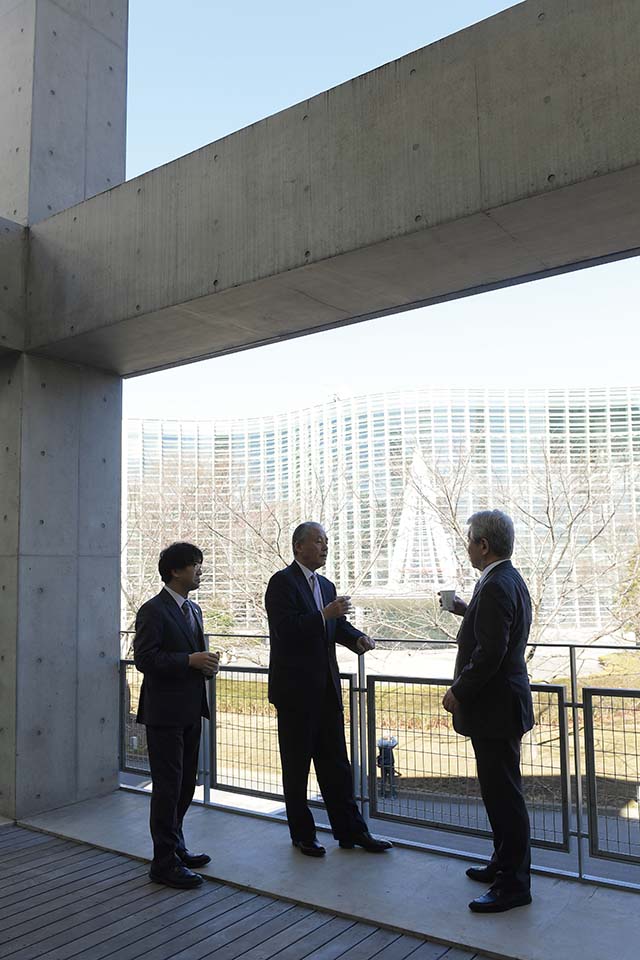
Tanaka The SDGs are incredibly comprehensive. They are also unprecedented in the sense that the United Nations General Assembly made a unanimous agreement on what we—humanity as a whole—should do. Holistic approaches are needed to realize the SDGs, so the increasing level of understanding of the SDGs amongst the government and the private sector in Japan is most welcome. It is very encouraging that many companies now consider their work towards SDGs to be their core business rather than working only to fulfil their corporate social responsibility (CSR).
Hasegawa There’s definitely rapid progress—for example, in the area of healthcare, the field I’m involved in. Under universal health coverage, Japanese companies and sympathetic organizations are raising funds to support and aid research on diseases in Africa and Central and South America (neglected tropical diseases). These are areas in which they weren’t previously involved.
ーPresident Tanaka has spoken of the proactive role GRIPS can play as a center for work towards the SDGs.
Hasegawa Of course, I think GRIPS should be a hub like that. For example: the creation of general healthcare systems in South East Asia, including hospitals and regional care; the development of model compact cities in the face of an aging society and depopulation—GRIPS can be a center for work on that kind of topic. There are limitless ideas GRIPS can help to disseminate.
ーPresident Tanaka, how does GRIPS intend to take this leading role regarding SDGs?
Tanaka Well, we should not be complacent, but Japan has a wealth of experience in building a comfortable and easy-to-live-in society. I believe we can become a source for this kind of knowledge and share it with the world. Professors at GRIPS should develop innovative research into what systems are best for sustainable development, working in an interdisciplinary manner with a future-focused outlook.
Furthermore, two thirds of our students at GRIPS are international students, and many of them are professionals with administrative experience in their respective countries. Interaction among students and between faculty members and students could result not just in knowledge in the form of research papers, but also in more innovative and practical ideas that will be useful in the field.
Hasegawa Perhaps the most pressing need is for a system for smooth operation of the super-aged society, a condition which Japan is encountering before other countries. There are many issues and many ideas, but currently there are still many regulatory obstacles. Nursing facilities and homes have to be built within the local government’s jurisdiction. Under that kind of rule, however, Tokyo would turn into a city of the elderly and would be unable to sustain itself. Suginami-ku, Tokyo finally managed to build an elderly care facility in Minamiizu-cho, Shizuoka through a cooperative agreement between the two local governments. If this succeeds, it looks like it will be an important point of reference in discussions about how Japan should deal with the aging issue.
Tanaka Whether something is a failure or a success, there is a tendency in Japan not to look for explicit causes for outcomes. Perhaps a useful mission for GRIPS would be to analyze these interesting processes of Japan, which are often tacitly understood, and reveal their characteristics as explicitly and systematically as possible—and then distill these as universal knowledge that people around the world can understand and apply.
Hasegawa An excellent mission. And there’s another important step: finding like-minded people.
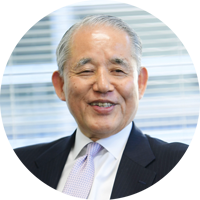
Guest
Yasuchika Hasegawa
Born in 1946, Mr. Hasegawa entered Takeda Pharmaceutical Company Ltd. in 1970. After rising to Chairman and CEO, he became Corporate Counselor in June 2017. He has held a number of other key positions, including Chairman of the Keizai Doyukai and External Director of Tokyo Electric Power.
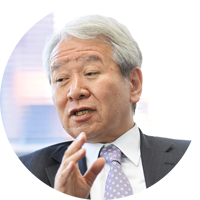
Host
Akihiko Tanaka
Born in 1954, President Tanaka graduated from the University of Tokyo’s College of Arts and Sciences in 1977, and gained a PHD from the Massachusetts Institute of Technology in 1981. He has been President of GRIPS since April 2017. Previous positions include Vice President of the University of Tokyo and President of JICA.
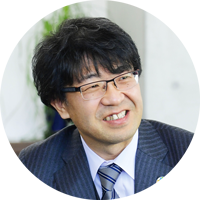 Facilitator
Facilitator
Atsushi Sunami
Vice President and Professor at GRIPS. Special Cabinet Office Advisor on Science, Technology and Innovation since November 2015.





